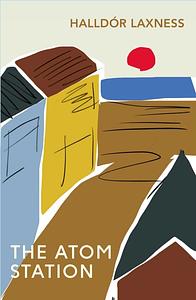You need to sign in or sign up before continuing.
Take a photo of a barcode or cover
Ulga is from a small hamlet in northern Iceland: she travels to Reykjavik in order to work as a maid in the house of a politician. Ulga also wishes to learn the harmonium, so she can play in the church her family is saving to build for their community. Learning to play music introduces Ulga to a whole cast of peculiar characters, including two men who think that they are gods. This is my third Laxness novel, and the strangest I have read so far. Many of the conversation are very absurdist, putting me in mind of Beckett, while other elements of the novel are concerned with very practical issues, like abortion or alcoholism. This is also a Cold War novel: America wants to "buy" Iceland, or at least be allowed to build an atomic base there, in order to be closer to the USSR. The characters feel that they are on the brink of losing their country, their sense of self, and of annihilation in a time of nuclear war. This pushes them to strange mental spaces, such as thinking of themselves as gods, or feeling completely detached from the people around them. Ulga doesn't share this conviction: she grounds the novel, as she cares about practical matters, as well as her own personhood and her attachment to the north of Iceland. But I found the final section of the novel confusing and elliptical, and Ulga's perspective seemed to shift so we lost the sense of her as an individual. This made me lose my connection with the story. I think Laxness is trying to do a lot of interesting things in a very small space, and juggling a lot of different themes: at times this is very beautiful, and at times it doesn't really pay off. However, he remains a stimulating and original writer.
Smá blendnar tilfinningar. Halldór Laxness er náttúrulega bestur, hann skrifar oft svo fyndinn texta, og það er ótrúlegt hvað maður tengir við persónurnar eftir allan þennan tíma.
Ég vildi bara að ég hefði haft einhvern guide með mér á meðan ég las, til að benda mér á allt sem ég VEIT að fór yfir höfuðið á mér. Ég er að hugsa um að lesa hana kannski aftur, með mömmu, þegar ég fer heim um jólin.
Ég vildi bara að ég hefði haft einhvern guide með mér á meðan ég las, til að benda mér á allt sem ég VEIT að fór yfir höfuðið á mér. Ég er að hugsa um að lesa hana kannski aftur, með mömmu, þegar ég fer heim um jólin.
dark
funny
medium-paced
Plot or Character Driven:
A mix
Strong character development:
No
Loveable characters:
No
Diverse cast of characters:
No
Flaws of characters a main focus:
Complicated
adventurous
funny
mysterious
reflective
medium-paced
Plot or Character Driven:
Plot
Strong character development:
No
Loveable characters:
Yes
Diverse cast of characters:
No
Flaws of characters a main focus:
Complicated
One of the better translated works I’ve read this year, the Atom Station tells the story of Ugla, a northern country girl who takes up work at the house of one of Iceland’s most powerful members of parliament during a controversial Cold War sale of Icelandic land for an American atomic station.
Right off the bat this is unapologetically anti-capitalist in its satire, and the further you read on the easier it is to predict how bad the “reception” part its wiki page will be. Not to say it tanked, the book was a financial success and sold out on day 1 of publication, but between Iceland and America’s governments Laxness had a pretty shit time off the back of this release.
What really stands out here, however, is Laxness’s personality. Even in its translation it’s so easy to feel a distinct and confident voice coming alive off the pages. Every character is exactly the kind of weirdo or charmer they should be, and Ugla’s transformation upon experiencing such new and eye opening things is wonderfully done.
The Atom Station is a pretty decent starter for foreigners on Icelandic culture, both modern and classic. Laxness covers here several perceptions of the great Icelandic Sagas, famous folk tales and even the Nation’s Darling: Jónas Hallgrímsson. On the modern side we also get satirical commentary on the different sets of criminals (ones who end up in the streets of Parliament and ones who end up in Reykjavik’s famous jail), as well as other bits and pieces covering protest, class and conservatism in Iceland.
It’s not without major flaws, particularly dated ones. Laxness writes Ugla relatively well, though there are moments that scream “male author writing woman” in a way that can take you out of it quite quickly, not to mention a few of the satirical tropes used here that aren’t great and become slightly repetitive, such as the book instinctively designating fat = rich and leaning on that cheap joke multiple times.
With all that said, a book from the 40s being this harsh toward the bourgeoisie and selling so well is real impressive, and reading through it you can tell how it achieved this: this story is endlessly fun and a translation couldn’t stop me from feeling how much Laxness writes like he’s cut from a different, funnier, cloth. Was a big fan overall!
Right off the bat this is unapologetically anti-capitalist in its satire, and the further you read on the easier it is to predict how bad the “reception” part its wiki page will be. Not to say it tanked, the book was a financial success and sold out on day 1 of publication, but between Iceland and America’s governments Laxness had a pretty shit time off the back of this release.
What really stands out here, however, is Laxness’s personality. Even in its translation it’s so easy to feel a distinct and confident voice coming alive off the pages. Every character is exactly the kind of weirdo or charmer they should be, and Ugla’s transformation upon experiencing such new and eye opening things is wonderfully done.
The Atom Station is a pretty decent starter for foreigners on Icelandic culture, both modern and classic. Laxness covers here several perceptions of the great Icelandic Sagas, famous folk tales and even the Nation’s Darling: Jónas Hallgrímsson. On the modern side we also get satirical commentary on the different sets of criminals (ones who end up in the streets of Parliament and ones who end up in Reykjavik’s famous jail), as well as other bits and pieces covering protest, class and conservatism in Iceland.
It’s not without major flaws, particularly dated ones. Laxness writes Ugla relatively well, though there are moments that scream “male author writing woman” in a way that can take you out of it quite quickly, not to mention a few of the satirical tropes used here that aren’t great and become slightly repetitive, such as the book instinctively designating fat = rich and leaning on that cheap joke multiple times.
With all that said, a book from the 40s being this harsh toward the bourgeoisie and selling so well is real impressive, and reading through it you can tell how it achieved this: this story is endlessly fun and a translation couldn’t stop me from feeling how much Laxness writes like he’s cut from a different, funnier, cloth. Was a big fan overall!
inspiring
reflective
medium-paced
Plot or Character Driven:
A mix
slow-paced
Plot or Character Driven:
Character
Strong character development:
Complicated
Loveable characters:
Complicated
Diverse cast of characters:
No
Flaws of characters a main focus:
Yes
I spent most of this book lost, but by the end I had a decent idea of who people were and why it mattered. The writing was relatively nice, some good quotes, but I’m glad to leave it behind now.







